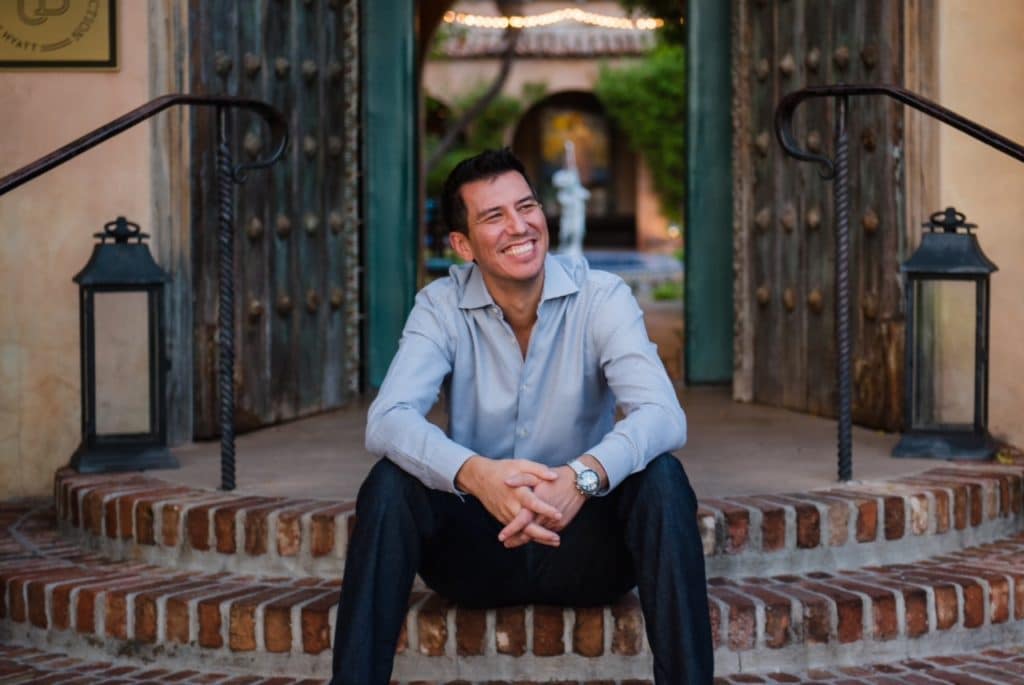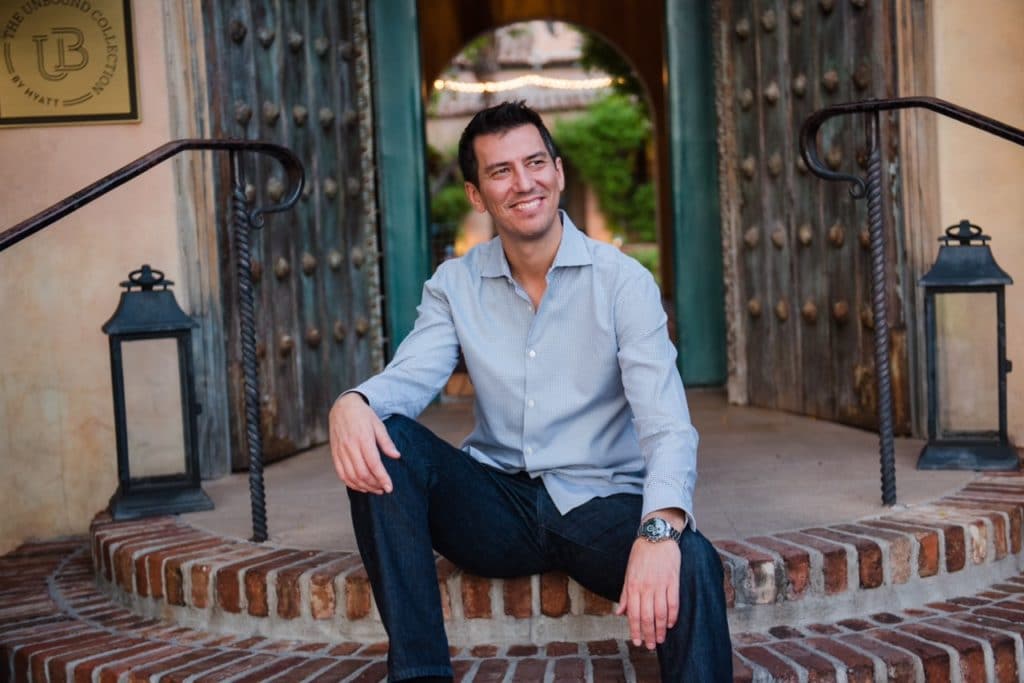Eugen Ilie joins us today for our Marketing Expert Roundtable. Eugen Ilie is currently the Director of Marketing at GoDaddy, the powerhouse that powers the world’s most amazing cloud platform dedicated to small and independent ventures. Prior to this, Eugen Ilie led the Growth team at LendUp in San Francisco, where he helped drive user acquisition initiatives across multiple channels. With over 15 years of digital marketing experience, across SaaS, lending platforms and financial services, Eugen Ilie has an interesting approach to Digital Marketing.
The editors of DotCom Magazine have been so impressed with Eugen Ilie’s career, that we are very excited to invite him to our Marketing Expert Roundtable. We have asked Mr. Ilie to answer a few questions regarding what it means to be a Director of Marketing at such a powerhouse company, and to help our interacted readers learn more about what it takes to be a leader in the marketing field.
1. Eugen, as an introduction, could you please tell our readers a little bit about yourself, and how long you have been a professional in the marketing field?
First of all, thank you for the opportunity to be here and share some of my experiences with you and your audience. I got started in this industry in the early 2000s, which I am sure you remember vividly, as you were a big part of my early steps in this field. Those were some amazing times, and I will tell you in a bit why. Between finishing my degree in Psychology and working in the afternoon and during the night, times were fascinating. I remember my work schedule being from 4PM to 3AM every day. I can tell you that I was drinking a lot of Diet Coke those days.
I always like to put things into perspective when it comes to my progression and the affinity I have towards digital marketing. Initially, I actually wanted to become a psychotherapist. I loved it, and that education has taught me a lot, not just about myself, but also about others. It also ingrained in me a certain academic approach to data and testing. That practice always helped me approach marketing slightly differently, and it helped me tremendously in my testing approach when I was building out some of my first marketing campaigns on search engines. If you recall, that was before Google AdWords was a thing – the times when the main pay per click engine was GoTo.com which renamed itself as Overture and then got acquired by Yahoo in 2003. It was a fascinating time, with a lot of opportunities for growth. I remember using statistical methodologies for optimizing campaigns, and used various attributes from the data to determine the best campaigns and keywords I should be bidding on. In those days, outbidding someone on pay per click was just a matter of bidding $0.10 higher than your competitor.
While managing various digital campaigns in paid search, I stumbled upon what were the very early days of affiliate marketing. I uncovered some amazing opportunities for the regular affiliate, which allowed them to expand or broaden their monetization capabilities through better technology and analytics. It was similar to what we know today as the RTB (real-time bidding) that allowed the affiliate to secure additional ads and also allowed them to be more in control of their traffic and ad inventory. One thing leads to another and about 5 years ago, I took a position with LendUp in San Francisco, for which I’m extremely grateful for. I learned a lot there, and it was an unbelievable experience to go through two series rounds of funding and see the company grow from 30 people to over 200 in less than a couple of years. My experience on the agency side, as well as working with a company that provided a direct to consumer product helped me tremendously in what I am doing today, and provided a very different perspective.
2. Eugen, what changes in online marketing have you seen in the past 10 years?
Over the last 10 years, we’ve seen an incredible growth in technology, which I believe will make it increasingly difficult for big companies to compete against small and nimble startups. The focus around the customer experience, life-cycle management and retention are things that are part of everyone’s conversation, from big companies to smaller ventures. I love that. The focus on the customer and their success is so important, and that’s finally something everyone is talking about.
The other thing that changed, together with the technology, is the focus on the digital presence. Look at every store you pass by in the mall, or any other brick and mortar store, they all have to pay attention to their online presence more than ever before. Beyond their day to day activities, they have to take into account social media, customer reviews, customer engagement, a multi-touch approach for their outreach and so much more. For the small business owner, this universe can be very overwhelming, but it definitely can be overwhelming for the larger organizations as well. The difference, of course, is the capital they have to deploy against these new trends and technologies. Fortunately, we are seeing a lot more companies and products launched focusing on the small business, and with the help of technology, the cost will not be as prohibitive.
Still, the larger organizations have the leverage to use data to their advantage and have the ability to build out complex algorithms to power smarter customer acquisition and outreach campaigns.
Another area, which I see being fascinating and fast growing, is influencer marketing – it took off right around 2015 and the growth since then has been incredible. Between YouTube stars with millions of subscribers, Instagram and Podcasts, today’s lifestyle entrepreneurs are what used to be the old day affiliates, but with better and more engaged followers. Their approach is not wide, but deep, they are all about building and establishing a personal relationship with the customer within their community. I am very excited to see how this will evolve, but I can say that conversations are going to change. Before, you paid a company to run your ads, in the future we will be thinking about partnering up with all of these amazing people that create deep connections with their followers. It’s not only an amazing shift we are seeing today in the market, but it’s very empowering too. We will have more entrepreneurs than ever before, and at a very young age as well.
Just take a look at a few stats around our environment today: TV viewing is declining 9.5% every year (Nielsen), 84% of marketers plan to run influencer marketing programs (eMarketer), customers acquired via word-of-mouth has a 37% higher retention (McKinsey), businesses make about $6.50 in revenue for every dollar spent on influencer marketing (Tomoson study). These are some incredible times, and we will see more and more of these trends coming to light. This year, we will start seeing companies implementing various strategies, some going after the mega-influencers, some going after the micro-influencers, with a much narrower scope and niche specificity. We will see the newer category coming alive as well, which is the nano-influencers, where the number of followers will be much smaller, but their engagement is incredibly high. Nano-influencers have a very tight community, which will create a very highly engaged campaign. The drawback, of course, will be the reach being much more limited, but I believe this is going to be an area of growth.
3. Eugen, in your experience, what is the number one thing a brand new company should do with their marketing to promote brand awareness?
The number one thing a brand new company needs to do, even before thinking about marketing, is to identify their own value proposition from a deep customer-centric perspective. They should answer some fundamental questions: Why is my product better? What is the value I am bringing to the customer? What is the problem I am trying to solve and is my goal truly aligned with the customer’s success? The marketing strategy will be a byproduct of that. It will be much easier to identify the right message, the brand perception they want to put out there, and where they should spend their money so they can increase awareness.

Obviously, the strategy will vary greatly by the type of business you are in, the industry and the competition and whether you are going after a niche market or you have wide reach.
Once you figured that piece out, testing will be a critical part of your strategy in the beginning. You will not know how the data is coming together, or what is the most effective strategy. But, if you have the right infrastructure and capabilities to track all the data that’s flowing through, it’s just a matter of time and, unfortunately, some testing budgets to get to the right answer.
One thing that I am seeing a lot, is the lack of expertise when it comes to tracking capabilities. I’ve seen so many times where the companies don’t have the basic foundation to organize the data and website events to make the right business decisions. Unfortunately, these days, without understanding the data flow and where your funnel breaks, you will not be able to be effective. The lack of diligence in setting things up right from the beginning can really cost you in the long run.
4. Eugen, In the leadership role that you have provided throughout your career, can you tell our readers what type of mindset you need walking into the marketing battlefield every day in order to be successful?
The number one thing is to love what you do, and be passionate about the value you will ultimately bring to your customer. Then, make sure you let your business analyst help you make the right decision. There is only so far you can go by trusting your gut.
The other thing you will have to remember is that your business environment changes very fast, so you will need to have a growth mindset. If you believe you’ve learned enough, or you are the expert, think twice, because someone else might have just beat you to the punch.
I am trying to listen more and more to various Podcasts (thanks to my lovely fiancé who is telling me about all the good stuff out there), not only to keep myself motivated but also to learn from others and open my mind towards new ideas. If you want to listen to a Podcast I find very helpful, check out the “School of Greatness” with Lewis Howes. He’s great!
5. Eugen, for company marketing experts that may be reading this, what would you say the three things they need to focus on every day to be successful?
Number one: Clean things up and remove any clutter (physically and psychologically). If you don’t have an organized desk, a roadmap and goals, you will not have a clear vision of what you need to do, so you will always play catch-up.
Two: Keep learning, and get good at data. Without a good understanding of your data and without crisp reports, you can’t improve your KPIs. Understand that behind a very simple message or strategy, that’s crisp and inspiring, there is a huge amount of research and data analysis.
Three: Keep iterating. Build out your MVPs, and don’t get stuck in a forever perfectionist attempt. By the time you are perfecting anything, it might already be too late and you missed the boat to get the learnings you needed to move forward. Move fast, but be thoughtful.
6. Eugen, can you tell our readers how social has changed the way companies need to think about their marketing strategies?
Many years ago, companies had a higher degree of control over their message and their company’s perception in the world. Today, not so much. Things are moving fast, and the power of social media is incredible. Today you will hear the company’s CEO talk about their products and even engage in conversations with their end-users. In today’s environment, whether or not a company has a social profile, you will still be impacted by it and it will change your business fundamentally. Having said that, you as a company, have to take your company’s perception seriously and always think about what’s in the best interest of your customer. When it comes to your overall outreach and strategy, you will have to think of social media as a serious channel with an incredible reach, so make sure you are growing your subscribers and followers. Today, 9 out of every 10 US internet users visit a social network site at least once a month. What’s even more interesting, when it comes to a channel distribution, the email channel has decreased in every age group except those 55 and older, while most of the conversations happen through various social sites. We also know that when we look at the overall metrics when it comes to channel performance, social media will perform very differently than paid search or other acquisition channels, so you will have to think about this channel very differently from a testing framework and value prop. Whether that’s for first user acquisition or retention. And to my earlier point, don’t think you can do it without data modeling and building response models to improve your campaign performance.
The other thing I would say about social media is this: social media will make you better in every way. Because you can’t ignore it, it will force you to be really good with your product and how you treat your customer. The power shifted from the business controlling most of the conversation, to the end-user (your customer).
7. Eugen, you are also a leader in the lead generation space. What changes have you seen in the past 10 years in this space, and has it affected an overall marketing plan?
Most companies, from a variety of industries, are still using various platforms, lead marketplaces, or lead generators to acquire new customers. Before I can answer how lead generation can be part of your marketing plan, we have to define what a lead generator means. Depending on the industry, a lead can be a customer/referral sent over to your business or it can be a customer that has a relationship with a different company and your company is just on the receiving end of their traffic (as an advertiser). One thing that is changing, is the personal relationship and the trust a customer places into the company they are engaging with. Which means a customer is much more aware and interested in who they are going to work with. Take as an example Yelp – the customer will choose the company with the best reviews and the best value from their platform. Today, there is a huge need for transparency in the marketplace, and we are seeing that across every industry. It’s obvious that customers are not only looking for the best deal anymore, but they are looking for the best company that matches their needs, and even more, a company that matches with their own internal values and principles, a company they can trust.
8. Eugen, how do you organize your day, and how important are lists and goal setting to be a marketing leader?
Have you heard about the book by Robin Sharma – 5 AM Club (Own your morning – Elevate your life)? I recently heard an interview with Robin Sharma and I got really inspired by it, so I started following this process. I am not yet there in following those exact habits, but I still try to get up early and hit the gym. That makes me feel fantastic and sets my day. I don’t necessarily believe in lists, but I do believe in having clearly defined goals. OKRs, which stands for Objectives and Key Results, developed by Andy Grove (Intel) and used by Google nowadays throughout their organization, is the framework I am following consistently in everything I do. If we talk about goals and quarterly results, you will hear me talk about OKRs. These are imperative to your success, and provides alignment within the organization. It’s a lot of hard work to come out with very specific quarterly objectives and key results, but once you have them defined, you will have a lot more fun along the way.
9. Eugen, in the past few years, you have been diving into data like never before. Can you explain the importance of Data Mining to the online marketing profession?
You will hear a lot of people talking about data, but I believe only a few of them understand the extent to which data can and should be used in your everyday campaign development. The importance of data is undeniable. If we don’t know what goes into our business, we will not be able to quantify or know how to solve the problems we are facing on a daily basis. So, not only is the data critical to your business, but the way the data is being structured and used is even more important. Using the data the wrong way can easily get you to the wrong decision. Here is an example: let’s assume you are making changes to your website, and by making those changes, your conversion rates go up, which means more customers finish the application (or hit the goal intended). That’s great news, right? At first look, things look great, but let’s say your goal, as a company, beyond someone submitting an online application, is for the customer to buy a product from you. If you are looking at your conversion rate alone, you might be missing the mark in terms of the impact on your revenues. Increasing the number of leads doesn’t necessarily mean that you are selling more, or you are selling higher priced products. It can very well be that your conversions went up, but your overall revenue per user declined. So,understanding the web events, the various touchpoints, the relationship between your visitor to conversion and to revenue is imperative to any marketing campaign you are running.
Beyond the event data buildout and measures of significance, building data models to predict certain outcomes, or building marketing response models, is something you can’t really live without in today’s environment. The cost will be prohibitive if you don’t use data models effectively to build out your target audience.
I would say that everyone should build out a great data foundation and construct tests with statistical rigor. By doing this, they should have a much higher chance to succeed in building out long lasting and scalable marketing campaigns.
Eugen, thank you very much for sitting down for a marketing expert round table. We are quite certain that our readers are going to love this information, and we hope that they will incorporate some of your ideas into their own marketing plans and professional approach. Thank you so much Eugen for taking the time out of your busy day to help educate others.























